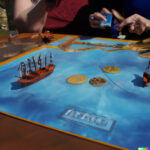Are you ready to dive into the exciting world of Avalon board game strategy? Whether you’re a newcomer to the game or a seasoned player looking to up your tactics, understanding the mechanics and team dynamics is crucial for success. In this article, we’ll explore everything from the basic gameplay mechanics to advanced tactics, common mistakes to avoid, and tips for choosing the right roles in Avalon.
Avalon is a thrilling game of deception, deduction, and hidden identities that will put your strategic thinking to the test. The game revolves around Arthurian legend and features two teams: the loyal servants of Arthur, and the evil minions of Mordred. As players embark on this epic battle of wits, understanding how to navigate the dynamics between these two teams is essential.
To excel at Avalon, players must grasp the intricate mechanics that govern gameplay as well as develop strategies tailored to their specific team alignment. Whether you find yourself fighting for good or embracing your darker side with the forces of evil, honing your skills and tactics will be instrumental in achieving victory. Let’s delve into the intricacies of Avalon board game strategy to equip you with the tools needed to emerge triumphant in this thrilling battle of deception.
Understanding the Avalon Board Game Mechanics
The Avalon board game is a strategic and social deduction game that pits the forces of Good against Evil in the realm of King Arthur. Understanding the mechanics of the game is crucial to achieving victory, whether you are playing as a member of the Good Team or the Evil Team. Here are some key mechanics to keep in mind when playing Avalon:
1. Role Cards: At the beginning of each game, players are assigned a role card that determines their allegiance and special abilities. The Good Team consists of loyal servants of King Arthur, while the Evil Team comprises minions of Mordred and the Assassin.
2. Quests: The main objective of the game is for the Good Team to successfully complete three out of five quests without being sabotaged by the Evil Team. Each quest requires a certain number of players to go on it, and their success or failure can significantly impact the outcome of the game.
3. Voting: Throughout the game, players must vote on various aspects such as which team will go on a quest or who should be accused of being a member of the Evil Team. Understanding how to sway votes in your favor is essential for both sides.
4. Casual Conversation: A critical mechanic in Avalon is informal discussion among players about who may be trusted or suspected. Paying attention to what others say and how they say it can help you discern their true intentions.
As you familiarize yourself with these mechanics, remember that adapting your strategy based on player count and choosing roles wisely are also essential factors for success in Avalon board games strategy.
The Importance of Team Dynamics in Avalon
In the game of Avalon, team dynamics play a crucial role in determining the success of both the Good Team and the Evil Team. The interactions and communication between players can greatly influence the outcome of the game. Understanding how to navigate these team dynamics is essential for mastering the Avalon board game strategy.
Building Trust and Communication
One of the fundamental aspects of team dynamics in Avalon is building trust and maintaining open communication. For the Good Team, trust is crucial in identifying fellow good players and solidifying their strategies. On the other hand, the Evil Team must also establish trust to effectively deceive and mislead their opponents. Effective communication allows players to convey information, share suspicions, and coordinate plans throughout the game.
The Influence of Roles
Each player’s role in Avalon greatly impacts team dynamics. For example, the Merlin must carefully maneuver through interactions to guide the Good Team without revealing their identity, while maintaining a sense of suspicion towards potential evil players. Meanwhile, members of the Evil Team must work together to subtly manipulate information and cast doubt on their opponents’ loyalties. Understanding how different roles contribute to team dynamics can significantly affect one’s overall strategy.
Managing Conflicting Personalities
In a game as social as Avalon, managing conflicting personalities within a team is vital for success. Personal biases, relationships outside of gameplay, and individual playing styles can all impact team dynamics. Learning how to navigate these differences while maintaining a cohesive approach to achieving objectives is an essential aspect of mastering Avalon board game strategy.
By recognizing the importance of team dynamics in Avalon and understanding how different aspects like trust-building, role influence, and managing personalities come into play, players can develop more effective strategies for both good and evil tasks within this thrilling board game experience.
Strategies for the Good Team
In the Avalon board game, the Good Team plays a crucial role in trying to identify the members of the Evil Team and successfully completing their quests. While it may seem like a daunting task, there are several strategies that the Good Team can employ to increase their chances of victory. Here are some effective strategies for the Good Team to consider when playing Avalon.
Establishing Trust
One of the key elements of success for the Good Team is building trust among its members. Open and honest communication is essential in establishing trust within the team. It is important for players to pay attention to how others behave during discussion rounds and observe their voting patterns during mission selections. By doing so, they can gauge who may be trusted allies and who might be secretly working against them.
Information Sharing
Sharing information openly with trusted teammates is critical for the Good Team’s success. Players should communicate any suspicions they have about certain individuals or provide reasoning behind their choices during specific phases of the game. This allows everyone on the Good Team to make more informed decisions about whom to trust or accuse, ultimately leading to better overall coordination and strategy.
Adapting to Player Count
Another important strategy for the Good Team is adapting their gameplay based on the number of players in a particular game. With larger groups, it becomes more challenging for individual players’ voices to be heard, so it’s crucial for team members to work together efficiently. Conversely, in smaller groups, having a clear understanding of each player’s role becomes even more essential due to fewer participants being involved in decision-making processes.
Overall, by implementing these strategies and emphasizing collaboration and communication among team members, the Good Team can improve its chances of victory in Avalon while effectively countering the tactics employed by the Evil Team.
Strategies for the Evil Team
The key to success for the evil team in the Avalon board game lies in deception and misdirection. As a member of the evil team, it is crucial to blend in with the good team and avoid raising suspicion.
One effective strategy is to actively participate in discussions and decision-making processes while subtly steering the team towards making choices that benefit the evil cause. This can be achieved by subtly manipulating information or sowing doubt about the loyalty of other players.
Another important aspect of the evil team’s strategy is creating confusion and chaos within the good team. By casting doubt on trust-worthy players or planting misleading information, the evil team can disrupt the good team’s ability to effectively identify their members. Creating division or fostering mistrust among good players can greatly undermine their efforts and lead to victory for the evil side.
It is also essential for the evil team to capitalize on any opportunities to undermine missions or sabotage tasks. By subtly influencing mission outcomes through strategic voting or covertly failing missions, the evil team can sow further discord within the group and reduce their chances of success. It is important for members of the evil team to work together seamlessly without revealing their true allegiance, ensuring that their actions do not raise suspicion among other players.
Ultimately, successful execution of these strategies requires coordination and communication among all members of the evil team. By employing cunning tactics, bluffing, and psychological manipulation, they can tip the balance of power in their favor and emerge victorious in Avalon.
Advanced Tactics for Avalon Board Game
The Avalon board game is not just about understanding the basic mechanics or having a good team dynamic. To truly excel at the game, players must also employ advanced tactics to outmaneuver their opponents and lead their team to victory. One key strategy is to pay close attention to voting patterns during the quest selection phase. This can provide valuable insight into who may be loyal to the evil team and who can be trusted.
Another advanced tactic is to carefully consider the timing of using special abilities, such as the Assassin’s assassination power or the Merlin’s ability to identify evil players. Using these abilities at just the right moment can heavily influence the outcome of the game. Additionally, paying attention to body language and subtle cues from other players can help in identifying potential threats and allies during gameplay.
Furthermore, it is crucial for players to master the art of deception and misdirection when playing as part of the evil team. By planting doubt among members of the good team and sowing discord, evil players can create an atmosphere of suspicion that works in their favor. Conversely, good players must also learn how to spot these deceptive tactics and remain vigilant throughout the game.
| Advanced Tactics | Description |
|---|---|
| Voting Patterns | Paying close attention to voting patterns provides insight into player loyalty. |
| Special Abilities Timing | The right timing for using special abilities can heavily influence game outcomes. |
| Deception and Misdirection | Mastery of deception helps evil players sow discord while good players remain vigilant. |
Common Mistakes to Avoid in Avalon
When playing the Avalon board game, it is important to be aware of common mistakes that can cost your team victory. One common mistake is being too trusting or suspicious of other players based solely on their previous actions. It’s crucial not to fall into the trap of assuming a player is good or evil based on one move, as this can lead to misjudgment and ultimately harm your team’s chances of winning.
Another mistake to avoid is not paying attention to voting patterns. Players should be observant of who votes for and against certain team members during mission selection. This can provide valuable insight into who may be part of the evil team, allowing the good team to strategize more effectively.
Lastly, a major error that players often make in Avalon is revealing too much information about their role and allegiance early in the game. This can easily backfire and leave your team at a disadvantage if you are targeted by the opposing side. It’s important to strike a balance between providing necessary information to gain trust from teammates without giving away too much and putting yourself in a vulnerable position.
| Mistake | Impact |
|---|---|
| Trusting or Suspecting Based on One Move | Can lead to misjudgment and harm team’s chances of winning |
| Not Paying Attention to Voting Patterns | Miss out on valuable insight into potential members of the evil team |
| Revealing Too Much Information Early in the Game | Puts oneself at risk of being targeted by the opposing side |
How to Adjust Your Strategy Based on Player Count
When playing the Avalon board game, it’s crucial to adjust your strategy based on the number of players in the game. The dynamics of the game can change significantly depending on whether you have a smaller or larger group. Here are some tips for adjusting your strategy based on player count:
- Smaller Groups (5-7 Players):
- Medium Groups (8-9 Players):
With a medium-sized group, the game becomes more intricate, and there is an increased potential for misinformation and misdirection. Good Team members should be strategic in forming alliances and gathering information, while Evil Team members need to carefully coordinate their actions to plant doubts without being too obvious. - Larger Groups (10+ Players):
In a larger group, it becomes challenging to keep track of everyone’s actions and allegiances. Good Team members should focus on creating strong teams within the group and using their voting power strategically. For the Evil Team, they must use chaos to their advantage by spreading mistrust and confusion.
In a smaller group, it’s important to focus on building trust and communication among team members. Good Team members should be more cautious when making accusations, as there are fewer players to draw suspicions away. As for the Evil Team, they should work on sowing seeds of doubt and manipulating information to their advantage.
Adapting your strategy based on player count is essential for success in Avalon. Understanding how the game dynamics change with different numbers of players will help you make more informed decisions and maximize your chances of winning.
Remember that adjusting strategies based on player count also involves being flexible during gameplay as dynamics may shift throughout the course of the game.
Tips for Choosing the Right Roles in Avalon Board Game
In conclusion, choosing the right roles in the Avalon board game is crucial for gaining an advantage over the opposing team. Understanding the mechanics of the game and the dynamics of your team will help in making strategic decisions when it comes to role selection. Whether you are on the good or evil team, knowing which roles to choose can significantly impact your chances of winning.
For players on the good team, it is important to select roles that can gather information and identify the members of the evil team. Roles such as Merlin, Percival, and the loyal servants are essential in gathering intelligence and protecting Merlin from being discovered by the evil team.
On the other hand, players on the evil team must carefully consider which roles can sow confusion and mislead the good team. The Assassin’s ability to eliminate a good player at game’s end can also be a game-changer.
Advanced tactics such as bluffing and counter-strategies based on player count can further enhance one’s gameplay in Avalon. Players should also be mindful of common mistakes to avoid, such as giving away too much information or falling into predictable patterns of behavior.
By combining these strategies with effective role choices, players can increase their chances of succeeding in Avalon board game. Mastering these elements will undoubtedly elevate one’s gameplay experience and contribute to achieving victory in this thrilling game of deduction and deception.
Frequently Asked Questions
How Do You Play the Board Game Avalon?
Playing the board game Avalon involves players taking on different roles within King Arthur’s court. The game is a social deduction game, where players must figure out who among them is loyal or evil.
What Does Percival Do in Avalon?
In Avalon, Percival’s role is to help the loyal servants of Arthur. Percival knows who Merlin and Morgana are, but not which one is which. Percival’s task is to guide the other players by using this knowledge.
What Does the Assassin Do in Avalon?
The Assassin in Avalon has the crucial task of trying to assassinate Merlin at the end of the game. If the Assassin correctly identifies and targets Merlin, then the evil team wins. This adds an extra layer of tension and strategy to the game.

I love playing all kinds of games – from classics like Monopoly to modern favourites like Ticket to Ride.
I created this blog as a way to share my love of board games with others, and provide information on the latest releases and news in the industry.





